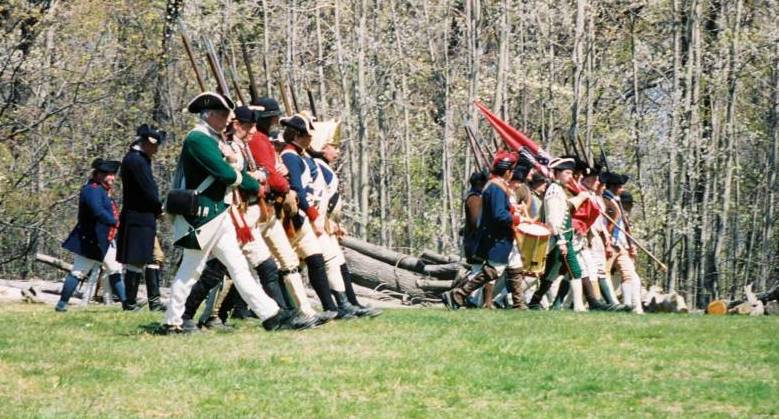 |
New Windsor Cantonment State Historic Site
hosts Revolutionary War military demonstrations and activities For more information please call (845) 561-1765. |
The National Purple Heart Hall of Honor, the New Windsor Cantonment Visitor Center feature the story of the Purple Heart, the history of the New Windsor Cantonment and Revolutionary War artifacts. Also be sure to visit Washington’s Headquarters in Newburgh, a short drive from the New Windsor Cantonment.
New Windsor Cantonment State Historic Site is part of the Palisades Interstate Park Commission. The Palisades Interstate Park Commission administers 27 park, parkways and historic sites for the Office of Parks, Recreation and Historic Preservation in New York as well as the Palisades Interstate Park and parkway in New Jersey. For more information about New York State parks and historic sites, please visit our website their web site.
The Last Encampment Today
For a calendar of events, call 845-561-5073
Or write to
Last Encampment of the Continental Army
19A Causeway
New Windsor, NY 12553


Members of the Disabled Veterans of America and reenactors take part in 1998 Flag Day ceremony.
Note the presence of the Confederate soldier (first man from the left in the right hand photo) who took part in a flag history presentation. He holds the "Stars and Bars", the first national flag of the Confederate States of America during the War Between The States. Was he Washington's emissary sent to us across the centuries so that the great state of Virginia might be represented at our Flag Day ceremony here on the very ground where the Father of Our Country patrolled and where our nation was forged?

Dave McTamaney of the Newburgh chapter of the Vietnam Veterans of America shows how to properly retire worn American flags. After a formal ceremony conducted by our veterans, the flags are "burned in a respectful manner" according to the US Flag Code. Colonial troops stand watch.
The Peace Bell erected in April 1983
To mark the 200th anniversary of the reading of the cessation of hostilities
to the Continental Army April 19,1783
That was eight years to the day since a small group of Minutemen stood in the way of the mighty British army on the green at Lexington, Massachusetts. The world had been turned upside down, and Americans had won their independence.

When word of a preliminary treaty came, Washington's orders of April 18, 1783 called for the event to be celebrated the next day by having the proclamation read at the head of each regiment after which "the chaplains with the several brigades will render thanks to Almighty God for all His mercies." He thanked his army for their gallantry and perseverance through their struggle in this "glorious revolution." Entreating them to be patient, he reminded them that they were still in the army until peace was actually declared and their discharges could be officially issued. While he did admonish them against "disorder or licentiousness" he urged them to have a good time saying "it would be ingratitude not to rejoice; it would be insensibility not to participate in the general festivity."
To that end, he ordered "such working-parties detailed to assist in making the preparation for a general rejoicing.." and "an extra ration of liquor to be issued to every man tomorrow , to drink perpetual peace, independence and happiness to the United States of America."
The final peace treaty was signed in Paris on September 3, 1783. Ben Franklin, John Adams and John Jay represented the United States. After American Independence was won, King George made a speech from the throne in which he said, "Religion, language, interests, affections may, and I hope will, yet prove a bond of permanent union between the two countries; to this end neither attention or disposition shall be wanting on my part."
Indeed, much of who we are as Americans comes from dear old Mother England. Our laws are based on centuries of English common law. Our constitution embodies principles put forth in her Magna Carta of 1215. Jefferson's Declaration of Independence and other American political thought embodies concepts espoused by English political philosophers. Our National Anthem is set to an English tune. Even if we remain, in the words of George Bernard Shaw, "two peoples separated by a common language,"affections and a permanent union between The United States of American and Britain have happily grown. In spite of that nasty little episode when her troops invaded our capital and burned The White House during the war or 1812, The United Kingdom has become perhaps our greatest friend.